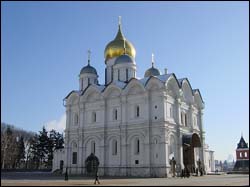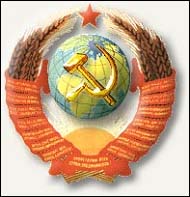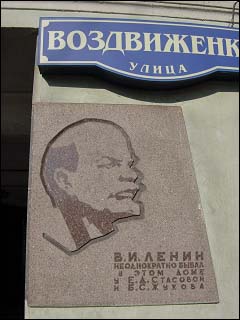 The Emergence of Russia
The Emergence of Russia |
Though Russia's earliest heritage can be traced
back to the Byzantine and Greek societies, the first
societies of Rus' or ancient Russia were Slavic
migrants. It was Kiev that was the capital of the
county called Kievskaya Rus'. The current capital
of the Ukraine, the city used to be the oldest city
in Russia. Rus' was dividing into small, rivalling
countries. Other old cities that can still be visited
today are Novgorod (Nizhny Novgorod), Smolensk,
Pskov, Chernigov.
A significant landmark of early Russian history
is the rule of Tartar-Mongol "Igo", which
dominated Russia for three centuries. Tartar-Mongol
Golden Horde seriously impacted Russian cultural
heritage; a lot of epos were devoted to Russian
heroism in the fight against the Tartar-Mongols.
Slovo o polku Igoreve (Word about Igor's cohort)
is considered to be the oldest Russian epos written
in the old Slavic language, and is now available
in both old Slavic and Russian languages.

Scandinavian attacks on Rus' were frequent. The
most famous battle of heroism of Russian units led
by Alexander Nevsky raged on the ice-covered Chudskoe
Lake. The battle was afterwards called Ledovoe poboische
or icy massacre. The ice broke under the weight
of Scandinavian knights armed with heavy armour,
drowning both Russians and their rivals, but it
helped Russians to win without proper armament.
Alexander Nevsky's famous phrase: ""Who
comes to us with a sword, will die from the sword"
was used as a slogan during all subsequent wars.
Though historians have been unable to pinpoint the
exact date of Moscow's establishment, the first
mentioning of Moskva or Moscow found in ancient
chronicles was dated 1147.
 The Middle Ages
The Middle Ages |
During the Middle Ages Russia gained standing, strength,
prosperity and new territories. Conquered were huge
areas in Central Asia, Siberia, Far East, and North
America. In particularly ruthless battles, regions
around in the Crimea peninsula were taken away from
the Turks and the Tatars. During the so-called Baltic
Wars, Peter the Great added more north-western regions
were to the already vast territories of Russia.
It was Peter the Great, the legendary tsar, who
started the transformation of Russia. He fought
to implement the experience from the West (e.g.
Dutch knowledge was used in shipbuilding) in military
training, construction and education. Peter the
Great built a new capital in Saint Petersburg in
1721 "on a big marsh" thus creating a
port city, which served as a "window to Europe".
Russia improved its military skills substantially
during late 18th - early 19th centuries, with outstanding
military strategic leaders, such as Alexander Suvorov.
France was the main ally of Russia until 1812 when
Napoleon attacked Russia. Just like Adolf Hitler
more than a century later, the great Napoleon had
to fight two enemies, the Russian and their resolve,
as well as the Russian winter. The determination
of the Russians not to give in to the French became
clear when they burned down most of Moscow just
moments before Napoleon was to enter the city. Napoleon,
however, never managed to defeat his twin-enemy,
and was lucky to make it back to France alive.
Despite the victory, Russia seriously suffered from
the war, and "wooden Moscow" suffered
a lot from the fire. As a result of the victory
over Napoleon Russia gained more territories in
Eastern Europe, but failed to expand south-west
and get control over the Balkans.
Importantly, in 1861, the peasant's serfdom was
abolished. Some hoped that the reform would put
an end to cruelty, but the effect was controversial.
Many peasants did not want the freedom, which meant
confusion and often starvation.
 The Rise of Communism
The Rise of Communism |

Russia was an influential, powerful and highly industrialized
empire, but social tensions among peasants and industrial
workers were growing. Those tensions led to the
revolution in 1905, which was successfully suppressed
by the authorities. Russia was exhausted by the
WWI having lost over 1 million people. The consequences
of the war combined with bad harvests, hunger and
epidemics, created a foundation for social unrest.
The outburst of public anger was drawing near.
In February 1917, Tsar Nikolai II was overthrown
and the first revolt occurred. Russia was announced
a Republic. Subsequently, The Great October Socialist
Revolution, lead by the legendary Vladimir Lenin,
swept (often quite literally) all the remnants of
the Romanov dynasty away. The political agitation,
fueled by the Russian Socialist Democratic Party
of Workers, aimed to support the most vulnerable
part of population workers and peasants. The movement
was supported by Germany, and had attractive slogans
about poor people having the wealth of the rich,
jobs and food for everybody.
The new authorities transferred all the land into
the possession of "all people" or actually
the state, and announced withdrawal from WWI.

|
In 1918-1922 Russia
experienced a civil war, which ended in a triumph
of Red Army, and paved the way for "the great
reconstruction". In 1921, Lenin introduced
the New Economic Policy.
All the wars and social disturbances weakened the
country, and drove it to the edge of collapse. Church
was heavily suppressed. Religion was replaced by
communist propaganda. Cruelty, murders, confiscation
of property and crime was covered by the name of
communism. The newly created state was called the
Union of Soviet Socialist Republics because it consisted
of many Soviet republics divided by nationality
principle and governed from the center. The communist
party of the Soviet Union was simply referred to
as "Party". Indeed, the USSR was a nothing
less than a completely centralized, one-party dictatorship
that sought to enforce a single-minded ideology.
Lenin's death in 1924, gave Josef Stalin the chance
to seize power, a reign through the implementation
of what is called 'The Great Terror' of the 1930s.
One party dictatorship come very close, if not entirely,
to a one person dictatorship of the immensely paranoid
Stalin. A cult of personality, it was called later
by his successor, Nikita Khrushchev. Under dictatorship
of Stalin the brutality was outrageous: millions
were shot dead as "enemies of the people"
and accused of treason in the name of industrialization
and agricultural collectivization. Many died in
labor camps ('Gulags'), where convicts were used
as a working force in extreme conditions. The prime
of the society was perishing in these camps. However,
most of the society had no choice but to blindly
follow the course of the leader. The constitution
of 1937 declared "the construction of socialism
in the USSR has been successfully completed".
The defeat of the Russian Empire in World War I
led to the seizure of power by the communists and
the formation of the USSR. The brutal rule of Josef
Stalin strengthened Russian dominance of the Soviet
Union at a cost of tens of millions of lives. Only
after his death in 1953, Nikita Khrushchev and the
communist party managed to start an initial reform
of the Soviet order. But, Khrushchev's rule brought
instability and political resentment to the USSR,
and with that his own demise. In 1964, he was ousted
by his colleagues.
His successor, Leonid Brezhnev constituted a lengthy
period of uneasy stabilization in the Soviet Union.
When he died in 1982, reforms topped the Soviet
Union's agenda once again in a power struggle between
the last of the Soviet leaders.
 The Demise of Communism
The Demise of Communism |
The Soviet economy and society stagnated for decades
until General Secretary Mikhail Gorbachev (1985-91)
introduced glasnost (freedom of speech) and perestroika
(restructuring) in an attempt to modernize the country,
as a result USSR split into 15 independent republics.
Soviet control in Central Europe broke down soon
after Gorbachev, in the famous year 1989, announced
a non-commitment to military escapades in the region's
populations' struggle to break loose from their
communist regimes. Also, at home, the soviet order
crumbled with the uncontrollable disruption of the
social, political and economic status quo it represented.
Communism turned out not to be just an ideology,
a party, and a state; it was an all-ruling order
of society, and some very strong attitudes and objective
interests within this society were dead set against
a brisk 'meltdown' of the order, as became clear
in the 1991 failed communist coup. This allowed
Boris Jeltsin to become the first president of the
Russian Federation. Since then, Russia has struggled
in its efforts to build a democratic political system
and market economy to replace the strict social,
political, and economic controls of the communist
period.
A decade after the collapse of the Soviet Union
in 1991, Russia is adamant though in its desire
to establish a modern market economy and achieve
strong economic growth. Unlike the mid-1990s, the
Russians are doing it themselves, not following
'foreign' political and economic models that come
from international institutions like the IMF and
the World Bank. In contrast to its trading partners
in Central Europe - which were able to overcome
the initial production declines that accompanied
the launch of market reforms within three to five
years - Russia has along way to go because all the
basic foundations of the economy were destroyed
during 70 years of communist era. Russia achieved
a slight recovery in 1997, but the government's
stubborn budget deficits and the country's poor
business climate made it vulnerable when the global
financial crisis swept through in 1998. The crisis
culminated in the August depreciation of the ruble,
a debt default by the government, and a sharp deterioration
in living standards for most of the population.
The economy started to recover in 1999 and 2000,
along with a renewed government effort in 2000 to
advance structural reforms, under the leadership
of newly elected president, Vladimir Putin. By now
Russia achieved some economical and political stability,
which attracted a new wave of foreign investment.
The economic and financial reform efforts made so
far have been more or less well received, and plainly
not only abroad. President Putin is liked most notably
by President Bush, but perhaps even more importantly
to Mr. Putin himself, his domestic approval ratings
are sky-rocketing. Growing social support for Putin
is largely due to strong personal features and a
contrast between 1998, or even the situation in
Russia before Putin's election in 2000, and current
socio-political processes.
Important dates in and since the collapse of Soviet
Union
· Multi-candidate elections for the new Congress
of People's Deputies are held the Soviet Union in
1989
· Communist Party of the Soviet Union renounces
its monopoly of power, 1990
· Failed hard-line coup hastens dissolution
of Soviet Union into fifteen sovereign states, 24
August 1991
· Soviet President Mikhail Gorbachev resigned,
bringing an end to the Soviet Union. Minutes after
Gorbachev's announcement the Soviet flag with its
hammer and sickle was taken down from the Kermlin
flagpole. It was replaced by the Russian tricolored
flag, December 25, 1991
· Commonwealth of Independent States formed
by eleven of the fifteen former Soviet Republics,
1992
· The Yelstin government implemented a major
liberialization of prices the first step in a plan
to create a free-market economy, 1992
· Voucher privatization begins, 1 October,
1992
· Russian Federation officially admitted
to the IMF and EBRD, 29 April 1992
· Supreme council votes to cancel the decree
of 1954 to give in the Crimea peninsula to Ukraine,
21 May 1992
· Supreme Council passes a law creating the
Ingush Republic splitting the Chechen-Ingushetia
Republic, 4 June 1992
· Beginning of privatization, 1 October 1992
· New Constitution adopted 12 December 1993
· Russian economy shows many problems, unemployment
high, 1993, 1994, 1995
· Russia becomes a member of the Council
of Europe, 28 February 1996
· G7 summit in Lyon France includes Russia,
28 June 1996
· Yelstin faces continued political unrest,
pressure from ultranationalist leader Vladimir Zhirinovsky
and others, 1996
· Violent Civil War in Chechneya continues,
Yeltin's image is tarnished with elections looming,
1996
· Ruble default, 17 August 1998
· Vladimir Putin becomes acting president,
31 December 1999, president since 7 May 2000. |

